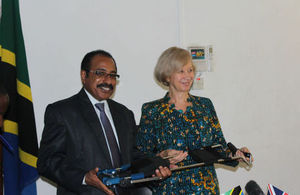British charity, UK Police Aid Convoys, gifts Tanzania medical equipment
On Friday 9 January British High Commissioner, Dianna Melrose, handed over medical equipment to Dr. Seif S. Rashid, Minister of Health and Social Welfare at the Ministry of Health and Social Welfare offices in Dar es Salaam.

HE Dianna Melrose, the British High Commissioner hands over Pediatric Leg Traction to Hon. Dr. Seif Rashid, Minister of Health and Social Welfare
On Friday 9 January British High Commissioner, Dianna Melrose, handed over medical equipment to Dr. Seif S. Rashid, Minister of Health and Social Welfare at the Ministry of Health and Social Welfare offices in Dar es Salaam. She did this on behalf of the British charity UK Police Aid Convoys.
Speaking at the event, Ms Melrose said:
“This medical equipment was donated by the British Ambulance Service and hospitals across the United Kingdom. We hope that the equipment will prove useful to Tanzanian medical institutions and benefit the people of Tanzania. The donation is a symbol of the close partnership between the UK and Tanzania in the health sector. The Department of International Development [UK Aid] supports programmes in Tanzania in reproductive health, water and is finalising a new £32.96 million Nutrition programme to reach over 3 million mothers and children.”
The medical equipment was sent to Tanzania, along with equipment for the Fire and Rescue Services and Police in a 42 feet container, organised by National Police Aid Convoys. It is a UK based charity, staffed by volunteers, that collect, sort and then dispatch this sort of equipment as donations to partner agencies all over the world.
On 11th December 2014 the High Commissioner presented equipment for fire fighters and Police and on the mainland to Home Affairs Minister Mathias Chikawe. This included protective clothing for fire fighters, breathing apparatus, medivac chairs and traction splints.
On Wednesday 7th January, she presented equipment from another container sent to Zanzibar to the Zanzibar Police Commissioner and the Fire and Rescue Service Commissioner. We were delighted to hear that the equipment proved useful in the rescue of people injured following the collapse of a building in Stone Town.
DFID is supporting a new £32.96 million Nutrition Programme (ASTUTE) to combat stunting in children aged under 5. ASTUTE is a 5 year programme (from 2014/15 to 2019/20) with of funding. This will support interventions to improve early childhood development and reduce the prevalence of stunting (low height for age) in Tanzanian children under 5 years old. It will focus on the first 1000 days of life from conception.
The UK is funding UNICEF in two regions and another group of organisations working in 5 regions. The programme will reach over 3 million mothers and children. The aim is to ensure that over 50,000 children under five years will not be stunted and have enhanced overall development. It should reduce the prevalence of stunting in Tanzanian children aged five by at least 7 percentage points in 8 target regions.
DFID is also providing £22 million for the Family Planning Programme Phase II over a four year period (2014-2018). This is designed to increase women’s use of family planning and the availability of comprehensive post-abortion care services across Tanzania. The programme is expected to reach over 1 million women by 2018 and result in over 916,000 fewer unintended pregnancies and 2,300 fewer maternal deaths. It will include training for health workers, outreach services to rural areas, and provide contraceptives to 80,000 young women to avoid unwanted pregnancies and reduce risk of unsafe abortions. Support will also be given for 28,000 women who have suffered sexual violence to both recover and to be able to advance their court cases, making the environment more supportive for women.